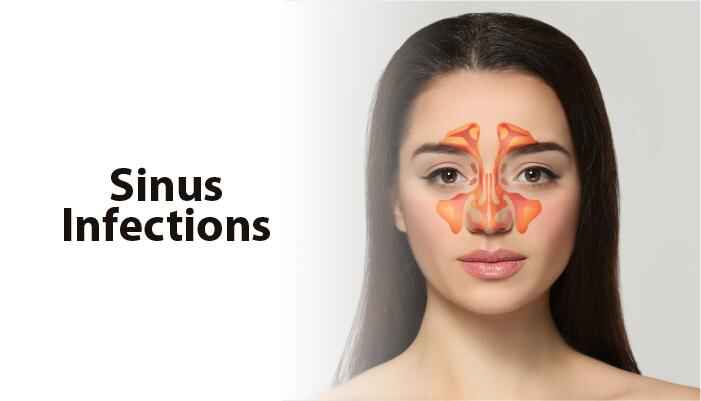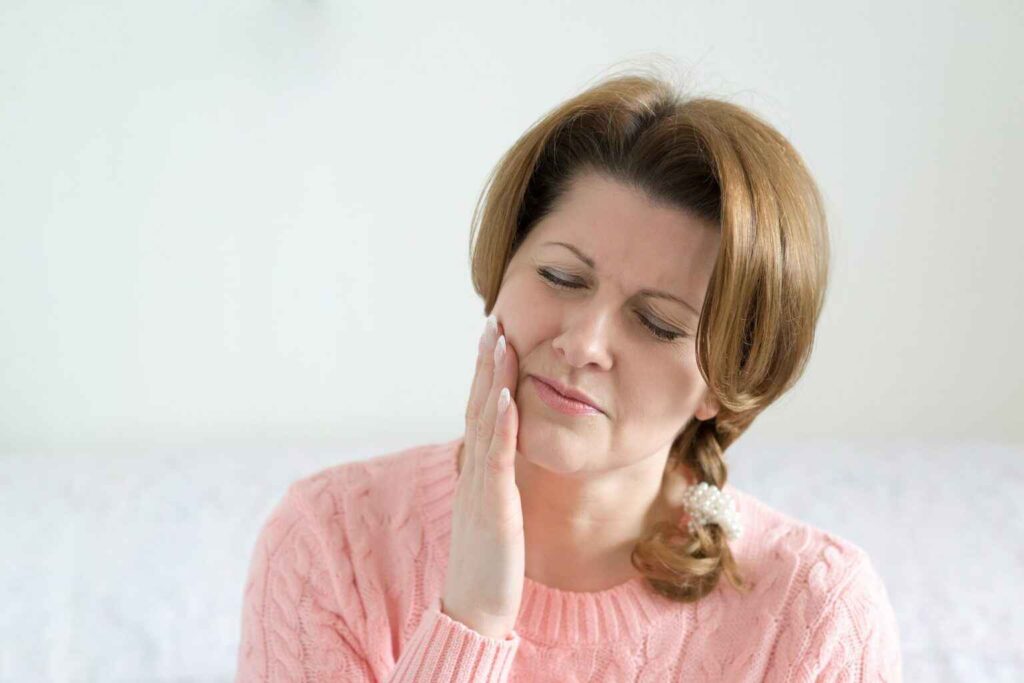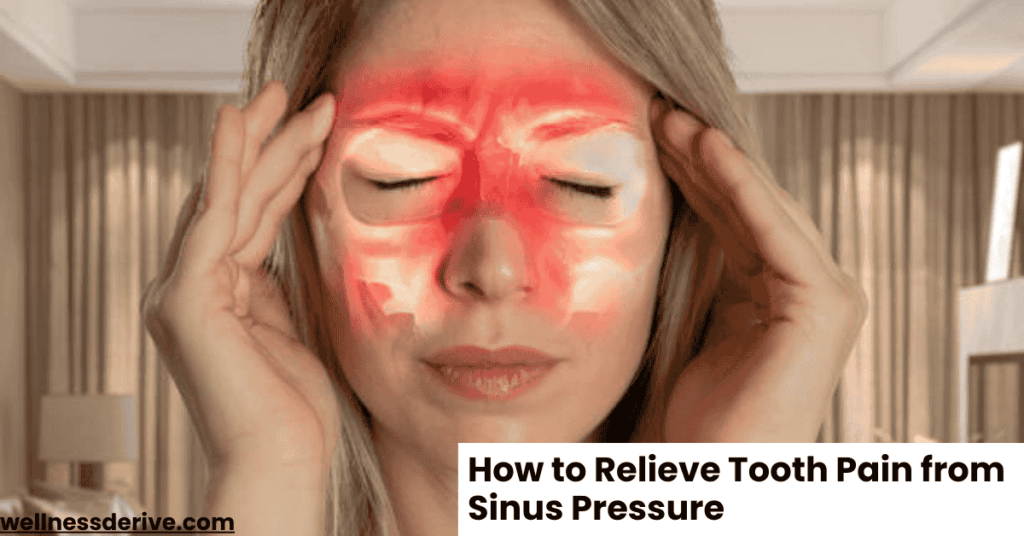Sinus pressure can cause unbearable tooth pain, making everyday activities uncomfortable. If you’ve ever experienced a sinus infection or congestion, you may have noticed tooth pain, especially in the upper molars. This happens because the maxillary sinuses are located close to the upper teeth, and when they become inflamed, they put pressure on the surrounding nerves.
If you’re struggling with sinus-related tooth pain, don’t worry! This guide will walk you through:
✔ Why sinus pressure causes tooth pain
✔ Home remedies to relieve sinus tooth pain
✔ When to see a doctor for sinus tooth pain
Why Does Sinus Pressure Cause Tooth Pain?
Sinus tooth pain occurs when sinus inflammation exerts pressure on the nerves of the upper teeth. This is common in conditions such as:
1. Sinus Infections (Sinusitis)

A sinus infection causes swelling and congestion in the sinus cavities, leading to tooth sensitivity and pressure pain.
2. Seasonal Allergies

Allergic reactions can cause sinus inflammation, triggering sinus-related tooth pain due to congestion.
3. Common Cold or Flu

When you have a cold or flu, mucus buildup in your sinuses can create pressure on your teeth, leading to discomfort.
4. Weather Changes

Rapid changes in temperature or barometric pressure can cause sinuses to expand and contract, leading to tooth pain.
🚨 Sinus tooth pain vs. regular toothache:
If your toothache worsens when you bend forward or press on your sinuses, it is likely sinus-related rather than a dental issue.
How to Relieve Tooth Pain from Sinus Pressure
If your sinus pressure is causing tooth pain, here are the most effective remedies to ease discomfort.
1. Use a Saline Nasal Spray or Rinse 🫧
A saline rinse helps clear out mucus, reducing sinus congestion and relieving tooth pain.
✔ Mix salt and warm water or use a pre-made saline nasal spray.
✔ Use a neti pot to flush out your sinuses safely.
✔ Repeat 1-2 times a day for best results.
2. Steam Inhalation 🌫️
Inhaling steam moisturizes nasal passages and helps clear sinus congestion.
✔ Boil water, pour it into a bowl, and inhale the steam for 5-10 minutes.
✔ Add essential oils like eucalyptus or peppermint for additional relief.
✔ Take a hot shower and breathe in the steam to ease sinus pressure.
💡 Why it works: Steam loosens mucus and relieves sinus tooth pain naturally.
3. Drink Plenty of Fluids 🥤
Staying hydrated thins mucus, reducing sinus pressure on your teeth.
✔ Drink warm teas, broth, or lemon water.
✔ Avoid caffeinated or sugary drinks, as they can cause dehydration.
✔ Use a humidifier in your room to keep air moist and prevent nasal dryness.
🚨 Pro Tip: Try ginger tea for its anti-inflammatory benefits!
4. Use a Warm Compress 🏵️
Applying heat reduces sinus inflammation and eases pressure on the teeth.
✔ Soak a towel in warm water, wring it out, and place it over your sinuses.
✔ Keep it on for 10-15 minutes while relaxing or lying down.
✔ Repeat 2-3 times a day for relief.
💡 Why it works: Heat promotes drainage, reducing tooth pain from sinus congestion.
5. Take Over-the-Counter (OTC) Medications 💊
OTC medicines can help reduce sinus inflammation and pain.
✔ Decongestants (e.g., Sudafed) shrink swollen sinuses and relieve pressure on the teeth.
✔ Pain relievers (e.g., ibuprofen, acetaminophen) ease sinus-related tooth pain.
✔ Antihistamines (e.g., Benadryl, Zyrtec) reduce allergy-related sinus swelling.
🚨 Warning: Avoid using decongestants for more than 3 consecutive days to prevent rebound congestion.
6. Sleep with Your Head Elevated 🛏️
Lying flat can cause sinus congestion to worsen, increasing pressure on your teeth.
✔ Use extra pillows to keep your head elevated.
✔ Sleep on your back to allow sinuses to drain properly.
✔ Avoid sleeping on your stomach, as it can put more pressure on your sinuses.
💡 Why it works: Gravity helps drain mucus, reducing tooth pain from sinus infections.
When to See a Doctor for Sinus Tooth Pain
In most cases, sinus-related tooth pain improves within a few days. However, seek medical attention if you experience:
🚨 Signs of a more serious infection:
✔ Severe facial pain or swelling
✔ High fever (over 101°F)
✔ Green or yellow nasal discharge lasting more than 10 days
✔ Persistent sinus pain despite home treatments
💡 Pro Tip: If the pain is in a specific tooth, lasts longer than 10 days, or worsens when chewing, see a dentist to rule out a tooth infection.
FAQs: How to Relieve Tooth Pain from Sinus Pressure
Final Thoughts: Relieving Sinus Tooth Pain
Sinus pressure can make your teeth hurt, but there are many ways to relieve the pain quickly.
✔ Use saline rinses and steam to clear congestion
✔ Apply a warm compress and take OTC pain relievers
✔ Drink plenty of fluids and sleep with your head elevated
✔ See a doctor if symptoms persist for more than 10 days
By following these simple and effective remedies, you can ease tooth pain caused by sinus pressure and feel better faster!
Disclaimer: The content on Wellness Derive is for informational purposes only and not a substitute for professional medical advice, diagnosis, or treatment. Always consult a healthcare provider for medical concerns.



